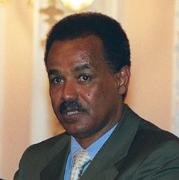Any celebration of Eritrean independence stands as a contradictory exercise. One of Africa's newest countries, the recent 17th anniversary of independence serves as an important reminder of the prolonged struggle for statehood. Eritreans first shrugged off a host of distant occupiers, including the Turkish, the Italians and the British. Then the international community, particularly the United States and the United Nations, falsely promised them a chance to vote for independence after spending a decade in a federation with Ethiopia, which saw their country as its own. When Ethiopia annexed Eritrea by force, the desire for freedom led to a 30-year armed conflict, which eventually created the modern state. The unwillingness to surrender to anyone forms part of the national character. In Tigrinya, the major language, it is known as kalsi weledotat or the "struggle of generations." This irrepressibility is combined with a fierce pride in the national achievement. Though the international community recognizes May 24, 1993, as the date of independence, Eritreans universally hold that liberation occurred two years earlier with the defeat of Ethiopian troops. The problem, however, is that the struggle did not end with independence. Most Eritrean exiles blame President Issaias Afeworki, the sole post-colonial leader, for their country's current problems. Once viewed as a liberator for leading his forces to victory over Ethiopia, he now presides over a single-party state, which outlaws even the mildest dissent. Issaias' People's Front For Democracy and Justice (PDFJ) has transformed Eritrea into a prison for the young: Exit visas are not granted to anyone under 45 years of age. "The people have learned the hard lesson that liberators can turn into monsters," said Balhbi Malk, a one-time member of Eritrea's university student movement who now lives in eastern Canada. "The people are compelled to live under the worst dictator in Eritrean history. The gross violations of human rights, socioeconomic and physical exploitations, oppression, lawlessness and horror have reduced the people to extreme poverty, hopelessness and exile."
On Independence Anniversary, Eritrean Exiles Lament Repression at Home

